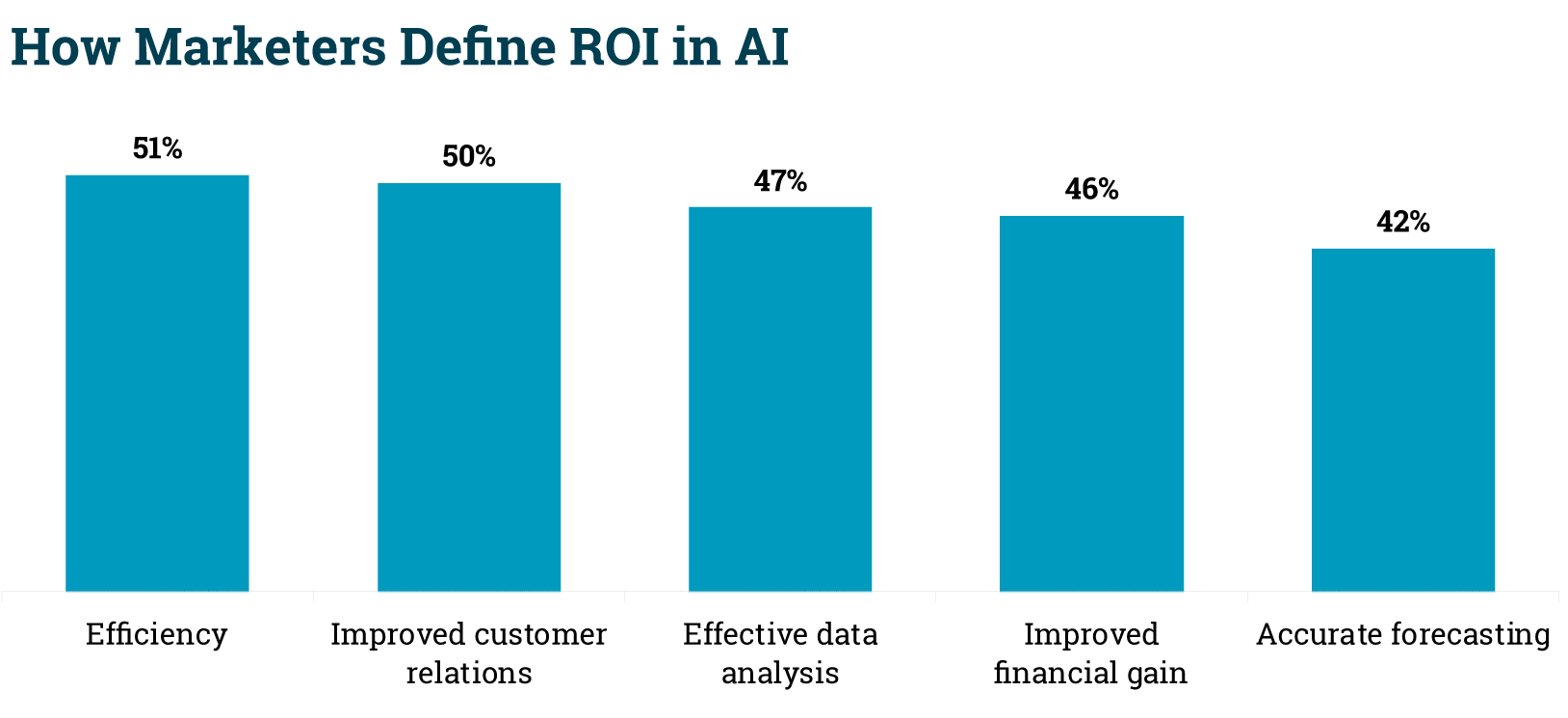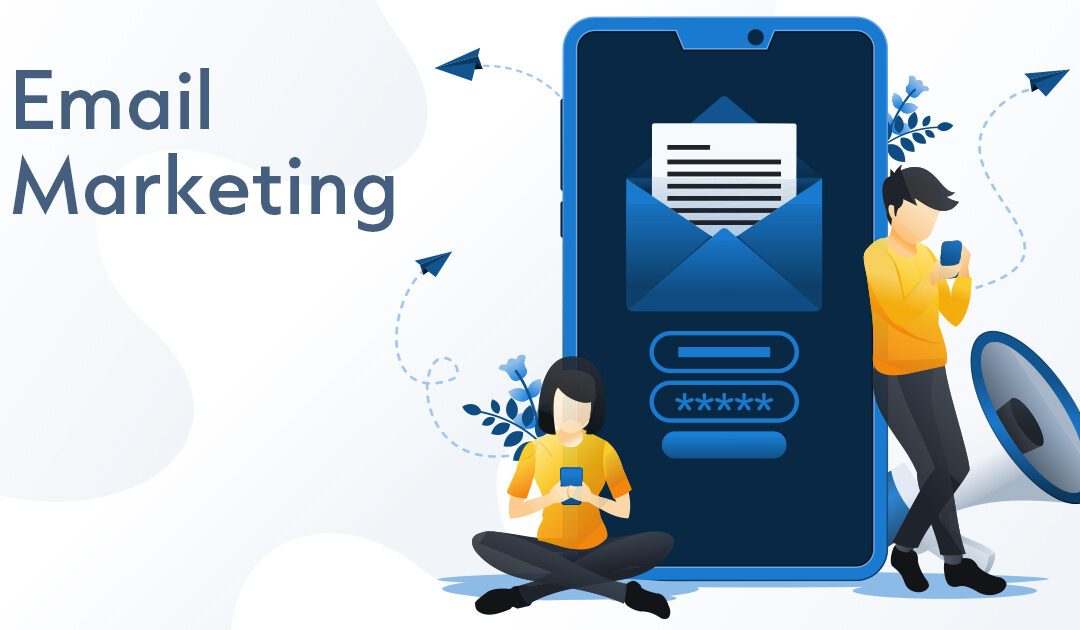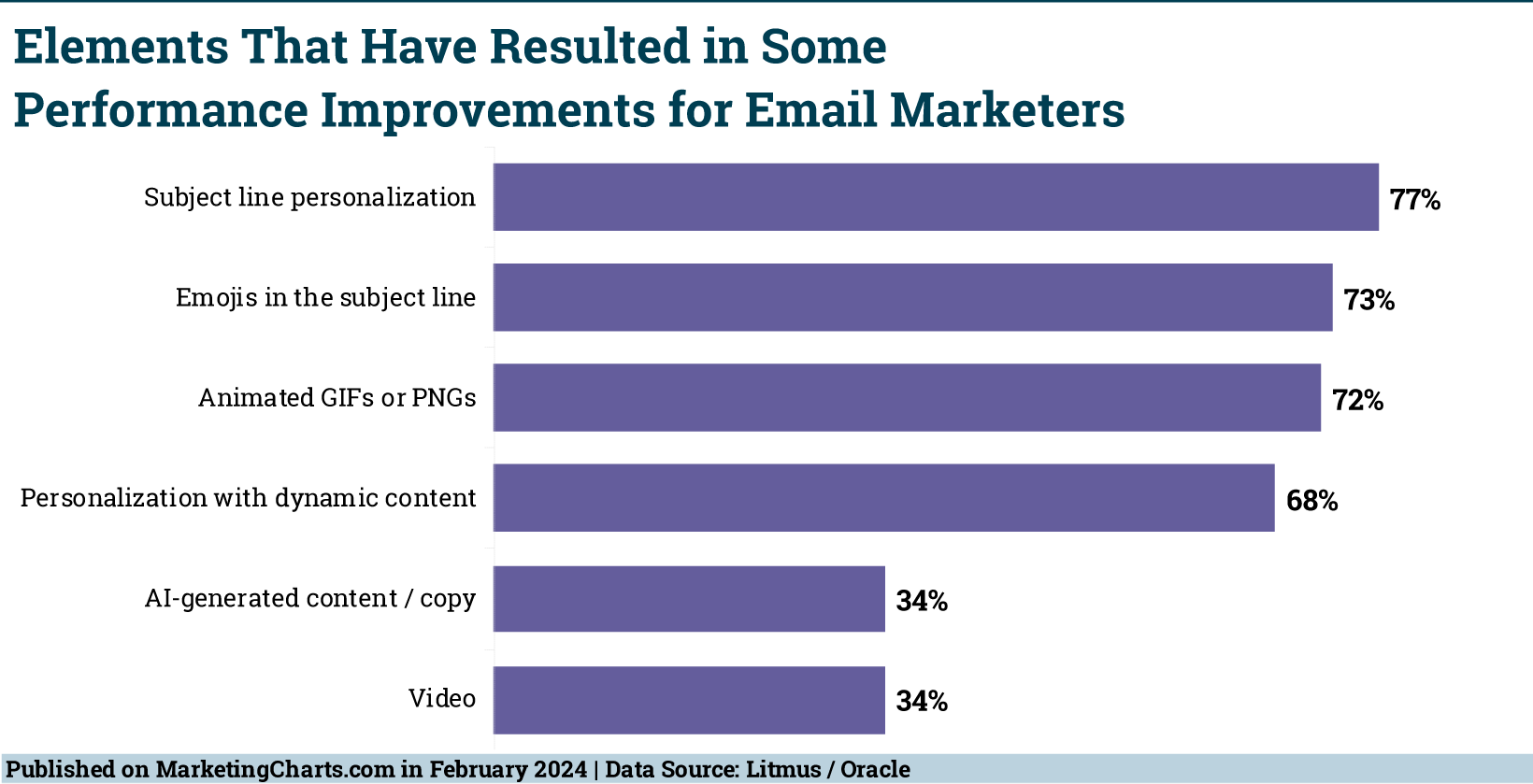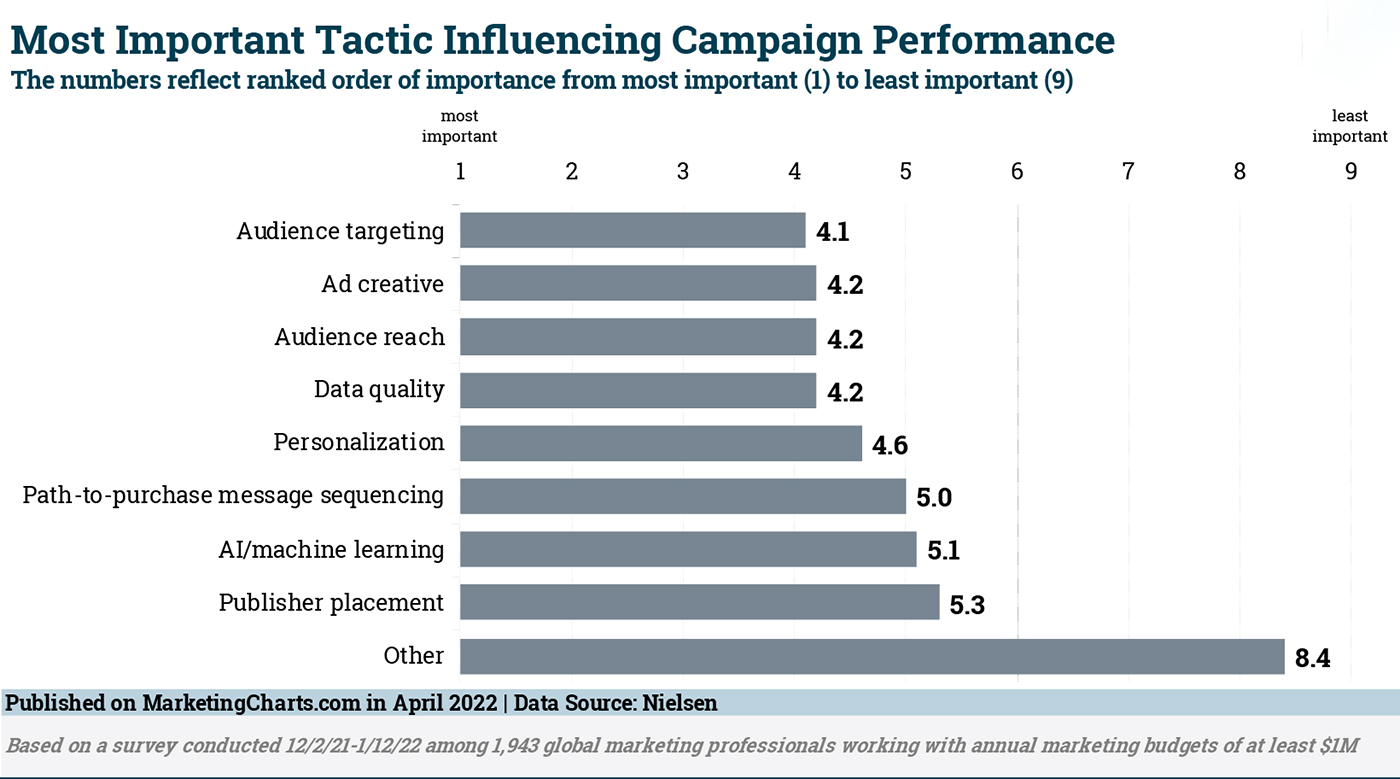
by Lori Berson | Apr 16, 2024 | AI, artificial intelligence, Data, Marketing Strategy
Marketing’s measure of success is often boiled down to a single metric: Return on Investment (ROI). However, recent research commissioned by Iterable and conducted by Wakefield Research, and published by Ad Age, suggests a shift in how marketers perceive ROI from investments in Artificial Intelligence (AI).

Efficiency and Customer Relations: The New ROI Drivers
Unlike traditional views that align ROI directly with financial gain, today’s marketers are increasingly valuing efficiency and improved customer relations as primary indicators of ROI in AI initiatives. The study reveals that 51% of marketers define ROI through the lens of efficiency gains, underscoring AI’s role in streamlining operations and enhancing productivity. Furthermore, 50% of marketers connect ROI with the improvement of customer relationships, highlighting the potential of AI to personalize customer interactions and allow for deeper connections.
Data Analysis and Forecasting: Enhancing Decision Making
While financial gains are still significant, with 46% of marketers linking ROI to improved financial outcomes, there’s a noticeable shift towards valuing the strategic advantages of AI beyond direct monetary returns. Additionally, 42% of marketers see the value of AI in providing accurate forecasting, which can be pivotal in strategic decision-making.
Marketers’ Adoption and Attitudes Towards AI
With 91% of surveyed marketers already using AI technologies, the perception of AI as a transformative force rather than just a tool is gaining traction, yet only 37% see it as an essential skill they must master, despite widespread concern about keeping up with technological advancements.
The Future of AI in Marketing: Opportunities and Challenges
This shift in perspective is not just theoretical. Marketers report that AI contributes to better job performance and operational efficiency. Most believe AI opens doors to new positions rather than replacing jobs, with 69% viewing AI as a creator of opportunities.
The shift in ROI measurement underscores a broader transition in marketing—from a purely financial focus to a multi-dimensional strategy that includes efficiency, customer relationships, and data-driven decision-making. As AI technologies continue to advance, their role in reshaping marketing strategies and defining new success metrics will undoubtedly expand, offering both challenges and opportunities for marketers aiming to stay ahead in their fields.
About the Data: The results are based on a September 2023 survey of 1,200 marketers.
For help infusing AI into your workflows, schedule a call or email Lori Berson at lberson@BersonDeanStevens.com.
BersonDeanStevens has been a recognized brand strategy and marketing leader for over 25 years. We work in partnership with you to differentiate your brand and achieve your business goals. AI use cases and client list.

by Lori Berson | Apr 3, 2024 | Email Marketing, Marketing
Email marketing remains a vital tool for businesses aiming to connect with their audience. However, the effectiveness of this tool is significantly influenced by how businesses choose to use artificial intelligence (AI) and personalization tactics. A recent Litmus report in partnership with Oracle provides an overview of the current landscape and the opportunities available with email marketing, revealing some insightful trends.

AI in Email Marketing: Underused Yet Potentially Transformative
AI-generated content and copy in email marketing, despite being a common use case, surprisingly ranks low in contributing to campaign performance improvements. This apparent underutilization is not a reflection of AI’s potential but rather indicates a nascent stage of adoption. With only one-third of marketers reporting a boost in email performance due to AI-generated content, it’s clear that those who have used generative AI are reaping significant benefits. This scenario presents a compelling opportunity for businesses to explore AI’s capabilities further and integrate them into their email marketing strategies.
The Unrivaled Impact of Personalization and Segmentation
The report highlights two critical tactics that overwhelmingly improve email marketing performance: subject line personalization and the use of emojis. An impressive 77% of email marketers have found that personalizing subject lines enhances campaign effectiveness, while 73% credit emojis with boosting performance. This data underscores the importance of crafting engaging and tailored content that resonates with the recipient, making the email more than just another message in their inbox but a personalized communication that captures their attention.
Beyond subject lines, personalization extends into the content of the emails themselves. Dynamic content, tailored to the recipient’s preferences and behaviors, has significantly increased click-through rates. This level of customization demonstrates a deep understanding of the target audience, making for a stronger connection between the brand and its customers.
Furthermore, an overwhelming 90% of surveyed email marketers acknowledged that segmentation plays a pivotal role in enhancing campaign performance. By dividing their audience into distinct groups based on specific criteria, marketers can deliver more relevant and impactful messages, thereby increasing engagement and conversion rates.
A Call to Action
The insights from the Litmus and Oracle report serve as a compelling call to action for email marketers. In an age where consumers are bombarded with digital communications, the ability to stand out through personalized, engaging, and AI-enhanced content is more crucial than ever. As email marketing continues to evolve, businesses must stay updated on these trends and leverage them to create meaningful connections with their audience. By prioritizing personalization, segmentation, and the strategic use of AI, marketers can transform their email campaigns into powerful tools for building lasting relationships and driving business success.
About the Data: The results are based on an October and November 2023 survey of more than 480 email marketers worldwide.
For help with your email marketing, schedule a call or email Lori Berson at lberson@BersonDeanStevens.com.
BersonDeanStevens has been a recognized brand strategy and marketing leader for over 25 years. We work in partnership with you to differentiate your brand and achieve your business goals. Client list.
![Most Important Marketing Tactics Contributing to Campaign Performance [Report]](https://bersondeanstevens.com/wp-content/uploads/2022/05/Marketing-Tactics.webp)
by Lori Berson | May 14, 2022 | Marketing
Almost 2,000 marketers around the world were asked by Nielsen to rank the order of importance of a variety of marketing tactics from most important (1) to least important (9) when considering the contribution to campaign performance.

The results of Nielsen’s 5th Global Annual Marketing Report indicate that audience targeting came out on top, with an average rank of 4.1. Following closely was a grouping of ad creative, audience reach, and data quality, each with an average rank of 4.2.
Rounding out the top 5 was personalization (average rank of 4.6), ahead of path-to-purchase message sequencing (5), AI/machine learning (5.1), and publisher placement (5.3).
Almost 5 years ago Nielsen released a report which found that at least for CPG campaigns, creative (quality/messaging) had a far greater contribution to sales lift from advertising than did reach or targeting. A more recent survey from Westwood One and Advertiser Perceptions, however, revealed that marketers and agencies believed that targeting was a bigger driver of sales than creative or reach.
One factor unique to this latest survey is data quality. Only about 1 in 4 (26% of) survey respondents strongly agree that they have access to the quality audience data they need to get the most out of their media budget, though it’s true that an additional 45% somewhat agree that they do. This is supported by recent research from Ascend2, in which only 1 in 3 respondents said that the quality of their data allowed them to make effective decisions on where to spend marketing and/or sales resources, though another 55% somewhat agreed.
More than 1 in 3 of the Nielsen survey respondents report the following to be extremely or very difficult: data access (36%); identity resolution (36%); actionable data insights (36%); data accuracy/quality (35%); and data scale (34%). An additional third or so find these topics to be moderately difficult.
About the Data: The results are based on an online survey conducted December 2, 2021-January 1, 2022 among 1,943 global marketing professionals at or above the manager level, working with annual marketing budgets of at least $1 million. Respondents were from the auto, financial services, FMCG, technology, health care, pharmaceuticals, travel, tourism, and retail industries.
Need assistance with your marketing strategies? Schedule a call or email Lori Berson at lberson@BersonDeanStevens.com.
BersonDeanStevens has been a recognized brand strategy and marketing leader for over 25 years, including over a decade in marketing and sales automation. We work in partnership with you to differentiate your brand and achieve your business goals. Client list.




![Most Important Marketing Tactics Contributing to Campaign Performance [Report]](https://bersondeanstevens.com/wp-content/uploads/2022/05/Marketing-Tactics.webp)
